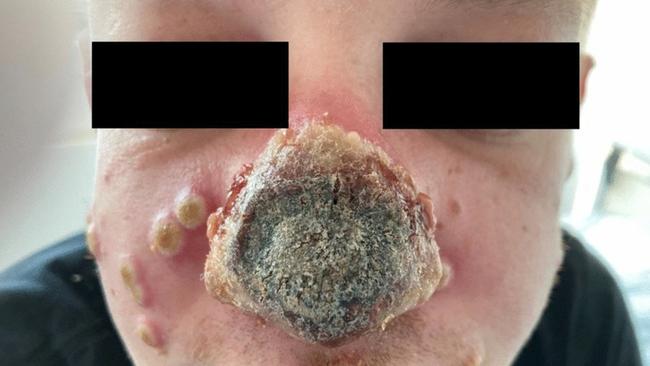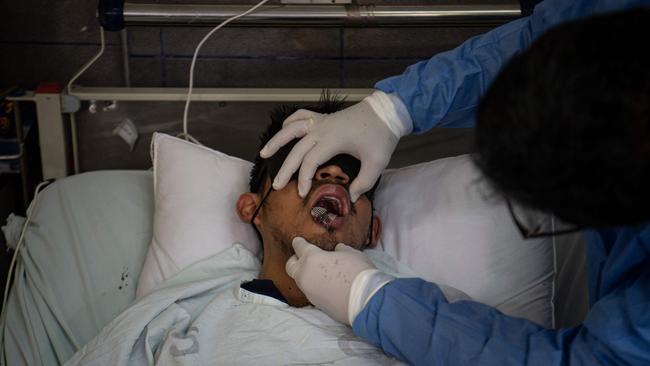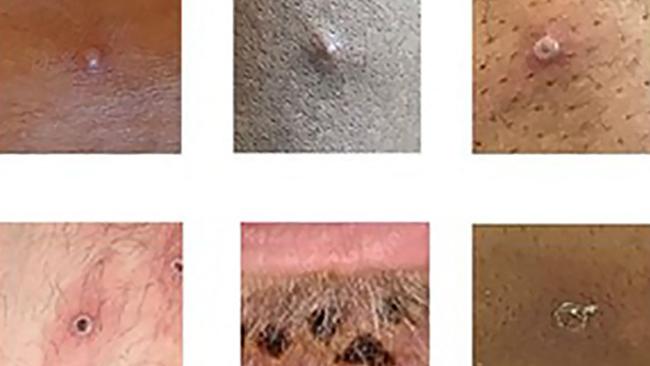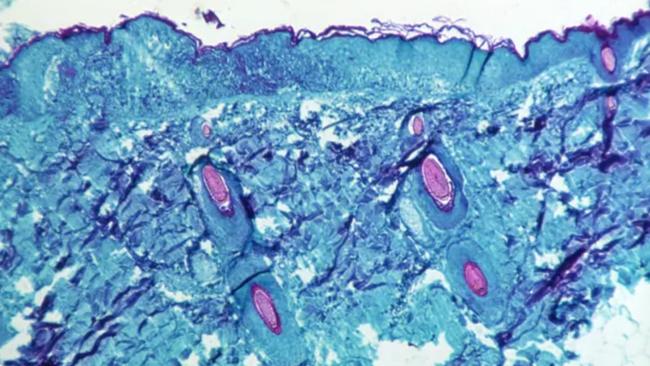Monkeypox patient’s nose is rotting amid report of first human to dog transmission
A horrific case of monkeypox has emerged in Germany, amid the first reported case of human to dog transmission. Warning: Graphic images.
World
Don't miss out on the headlines from World. Followed categories will be added to My News.
A horrific case of monkeypox has seen a man’s nose begin to rot, after he was initially misdiagnosed with having sunburn.
The 40-year-old German was reportedly sent home after seeking medical advice for a red spot that had developed on his nose.
A few days later, the lesion had turned black, while pus-filled sores popped up all over his body. The sores were particularly severe around the man’s mouth and penis.

The man attended hospital where he tested positive for monkeypox and given antivirals to combat the symptoms.
Further tests revealed he also had syphilis and was HIV positive.
The previously undiagnosed sexually transmitted diseases were advanced, with the syphilis having spread to multiple organs, and the HIV having developed into AIDS.

Antiviral medication was successful in drying out the sores on the man’s skin, but only partially improved the nose by reducing swelling.
The case was documented in the medical journal, Infection, which reported the monkeypox case was more severe due to the man’s HIV, which left him immunocompromised and susceptible to necrosis — the death of body tissue.

There are currently just over 38,000 monkeypox cases worldwide, according to the Center for Disease Control and Prevention, with the virus declared a public health emergency in the US earlier this month.
Gay and bisexual men account for about 98 per cent of monkeypox patients, but women, children and heterosexual men are equally susceptible if directly exposed to the virus.
Studies are under way to see whether genetic changes in the monkeypox virus are driving the rapid spread of the disease, the World Health Organisation told AFP on Wednesday.
FIRST HUMAN TO DOG TRANSMISSION
The World Health Organisation has urged people infected with monkeypox to avoid exposing animals to the virus following a first reported case of human-to-dog transmission.
A first case of human-to-dog transmission of monkeypox - between two men and their Italian greyhound living together in Paris - has been reported in the medical journal The Lancet.
“This is the first case reported of human-to-animal transmission .. and we believe it is the first instance of a canine being infected,” Rosamund Lewis, the WHO’s technical lead for monkeypox, told reporters.
Experts had been aware of the theoretical risk that such a jump could happen, she said, adding that public health agencies had already been advising those suffering from the disease to “isolate from their pets”.
She also said “waste management is critical” to lowering the risk of contaminating rodents and other animals outside the household.

Studies are under way to see whether genetic changes in the monkeypox virus are driving the rapid spread of the disease, WHO told AGP on Wednesday.
The two distinct clades, or variants, of the virus were called the Congo Basin (Central African) and West African clades, after the two regions where they are each endemic.
On Friday, the WHO renamed the groupings as Clade I and Clade II respectively, to avert the risk of geographic stigmatisation.
It also announced that Clade II had two sub-clades, IIa and IIb, with viruses within the latter identified as being behind the the current global outbreak.
On Wednesday, the UN health agency specified that Clades IIa and IIb are related and share a recent common ancestor - therefore IIb is not an offshoot of IIa.
Originally published as Monkeypox patient’s nose is rotting amid report of first human to dog transmission





